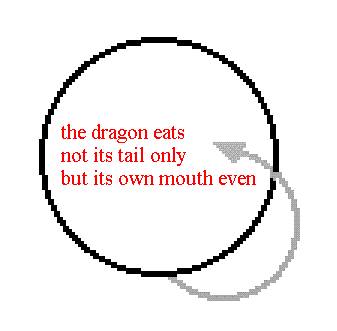New York Times correction ouroboros
[ by Charles Cameron — irresistible but sad, sad, sad ]
.
Gary Johnson, Libertarian Party presidential candidate, flubbed a question about Aleppo in an interview:
That’s not great.
The New York Times then corrected him:
Gary Johnson, the former New Mexico governor and Libertarian Party presidential nominee, revealed a surprising lack of foreign policy knowledge on Thursday that could rock his insurgent candidacy when he could not answer a basic question about the crisis in Aleppo, Syria.
“What is Aleppo?” Mr. Johnson said when asked on MSNBC how, as president, he would address the refugee crisis in the Syrian city that is the de facto capital of the Islamic State.
That’s not great either.
The Times then had to correct its correction of Mr Johnson:
Correction: September 8, 2016
An earlier version of this article misidentified the de facto capital of the Islamic State. It is Raqqa, in northern Syria, not Aleppo.
That’s having to eat your words.
The Times then had to correct its correction of its correction of Mr Johnson:
Correction: September 8, 2016
An earlier version of the above correction misidentified the Syrian capital as Aleppo. It is Damascus.
That’s having to admit that when you had to eat your own words, you didn’t even chew them properly.
Ouroboros!
**
For the record, everyone concerned has my sympathy. Eating one’s own words, eating one’s hat, eating humble pie is seldom pleasant — or in the case of the serpent, eating one’s own tail!
Full disclosure: I too have blind spots, am vastly ignorant, and am prone to error. Plus I’m terrible at geography.




September 9th, 2016 at 7:14 pm
Here’s another ouroboros I’d been stashing. It’s a self-reference in an RFERL “Under The Black Flag” analysis of Syria:
Yet another pointer to the fact that formal patterns are often indicators of matters worth thinking about, exploring, etc.